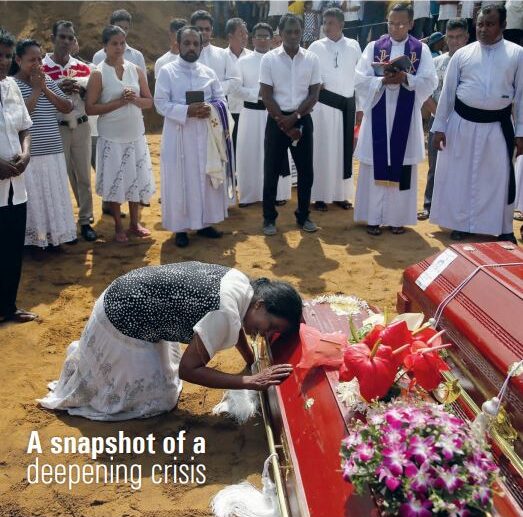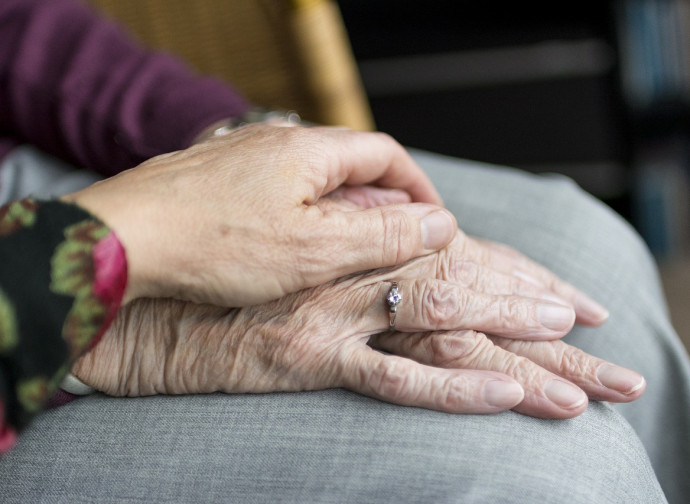
There continues to be a high degree of religious practice in Ireland even while churches and houses of worship are closed to the public during the covid-19 lockdown.
That’s according to a new poll from Amarach Research, commissioned by The Iona Institute.
It found that 27pc of the public have watched or listened to at least one religious service during the current period, and 18pc are praying more than they usually would.
The survey also finds: 85pc believe we will value family more after the lockdown ends; 75pc think we will value the elderly more; and, 31pc believe we will be more spiritual.
A more detailed look highlights some unexpected findings. For example, 24pc of 18-24 year olds saying they are praying more than usual. This is the same as for over 55s, but far higher than the age groups in between. Some 37pc say they are praying about the same as usual; while just two percent say they are praying less than usual.
The poll (conducted in the first and second weeks of April) finds that 15pc of those aged 18-24 have watched at least one religious service in the current period. This rises to 44pc among the over 55s.
Commenting on the findings, Brendan Conroy of The Iona Institute said it is “encouraging that so many people are still taking part in religious services in whatever way they can during the current unprecedented situation.
He continued: “It is also good to see that almost one in five people are praying more. This is a natural religious reaction in a time of crisis.
“It is also obvious from the survey that people are using this time to take stock”, he said.

The Catholic Bishops’ Marriage service is offering a free and confidential ‘Relationships Support Phone Line’ to help those experiencing extra pressure due to social restrictions imposed by the COVID-19 lockdown.
Calls to Accord counsellors are 45 to 60 minutes in duration and work on identifying key problems such as causes of conflict, ‘Pressure cooker’ environments, effects on children, and particular weaknesses in already-vulnerable relationships.
The counsellors will offer tips to people such as keeping lines of communication open; productive ways of raising issues with your partner; and speaking from ones own feelings and difficulties rather than blaming and being critical of your loved one.
Insofar as issues such as bereavement or serious illness impact the couple relationship, callers can discuss these issues with a counsellor on the Support Line. If the issue is about a specific personal bereavement or health issue, then referral to a specialist may be required.
Accord also provides resources on its website and on social media based on feedback from counsellors who have dealt with relationship and family difficulties experienced during these confined times.

In a letter to Members of the Legislative Assembly, the Bishops reiterated the moral claim of the unborn to life and said the direct and deliberate intention to end the life of an unborn baby was wrong.
While they recognise that the legislation passed into law by the Westminster Parliament stands now to be implemented, nonetheless they said, “we are morally obliged, wherever possible, to do all we can to save the lives of unborn children, which could be lost through abortion, and to protect mothers from the pressures they might experience at the time of an unplanned pregnancy”.
In particular, where the current regulations go beyond the requirements of the Northern Ireland Act 2019, they urged the formulation of revised Regulations to “reflect more fully the will of a significant majority of the people in this jurisdiction to protect the lives of mothers and their unborn children”.
“Indeed, as the NIO has noted, this commitment to protect life was expressed by 79% of people, who responded to the consultation exercise conducted by the UK Government last December,” they add.

Doctors may no longer conduct surgery to alter the biological sex of children, the equalities minister in the UK has announced.
Liz Truss will set out details of the plans later this summer that would ban under-18s with gender dysphoria from genital reconstructive surgery.
Giving evidence to the Women and Equalities Select Committee, she said “I believe strongly that adults should have the freedom to lead their lives as they see fit, but I think it’s very important that while people are still developing their decision-making capabilities that we protect them from making irreversible decisions”.
She also said she would ensure the “protection of single-sex spaces”.
Responding to the minister’s comments, a spokesperson for Mermaids, a lobby group for transgender rights for children, said: “It would be an extraordinary move for the Minister for Women and Equalities to support the introduction of a new form of inequality into British medical practice, by effectively treating transgender teenagers as less capable than their cisgender peers.”

Doctors in the Netherlands can no longer be prosecuted for carrying out euthanasia on patients with dementia who had previously given written consent.
Prior to this, it was required by law for patients to confirm their request, but on Tuesday the Dutch Supreme Court ruled this was no longer necessary.
The decision comes after a doctor was taken to court for carrying out assisted suicide on a patient with Alzheimer’s, who had previously asked for the procedure in a statement.
Prosecutors said the doctor did not properly consult the unnamed 74-year-old. But the family supported the doctor’s decision, and she was acquitted of any wrongdoing last year.

Attacks on Christians and their places of worship in India continued to escalate in both number and severity in the early months of 2020, with 27 violent incidents reported in March alone.
United Christian Forum in India, a Christian organization that advocates on behalf of Christians in India, documented 56 threats against Christians as well as 78 incidents of violence between January and March of 2020.
According to UCF, the attacks were perpetrated by mobs objecting to Christians holding worship services.
Persecution watchdog International Christian Concern warns that while India’s national lockdown in response to the COVID-19 pandemic has slowed down the number of attacks on Christians, such attacks will likely return when the lockdown is eventually lifted.
“More must be done in India to secure the rights of the country’s Christian minority and bring the perpetrators of these attacks to justice,” says ICC.
India is ranked 10th on Open Doors USA’s World Watch List of countries where it is most difficult to be a Christian. The organization says that Christians in the country face “horrific” levels of violence from extremists, with thousands of attacks taking place every year.

Priests and lay chaplains in the Archdiocese of Dublin have recounted some of their experiences in ministering to the sick and the bereaved during the coronavirus pandemic.
36 ordained and 40 lay chaplains provide this service across a wide range of healthcare facilities.
Fr. Damian O Reilly at St. Vincent’s Hospital called it one of the most challenging experiences of his priestly life. “To be working alongside health care professionals and all the staff of the hospital is truly a very humbling experience – one of care, kindness and compassion from all the staff and departments who are working very closely together to ensure that the best possible patient care of the highest standard is provided to each patient”.
The hospital chaplaincy team is made up of two ordained chaplains and four lay chaplains who provide a 24/7 chaplaincy service to the patients their families and to staff.
“Trained for the use of PPE we attend to the pastoral and sacramental needs of each patient when requested by either the patient themselves or by a member of the family or next of kin. We are available to support the families for whom this a particularly difficult time – because of the restrictions, families are unable to be with their loved ones and this is particularly difficult if the loved one is dying. To be a pastoral and spiritual support especially to the family is vital,” he said.

An Irish nun, aged 103 years old, has become Ireland’s oldest coronavirus survivor.
Sister Martha Hickey was born in 1917 and joined the Sisters of the Infant Jesus aged 19.
The order had founded a school for girls in Drishane, Millstreet in 1909, and soon added a saw mill, a brush factory, a knitting factory as well as running a farm.
The centenarian, who has devoted over 80 years of her life to the Church, first fell ill at her nursing home in Co. Cork over three weeks ago and was admitted to hospital.
Suffering with a high temperature and respiratory problems, a hospital test later confirmed that the Limerick native was coronavirus positive.
Despite her notable age, the brave pensioner’s recovery was helped by her having no underlying health conditions.
Martha’s overjoyed family are now eager to share her story. “We are just so proud of her,” said Anne Linehan, who is one of the devout nun’s many nieces.
“We really didn’t know what to expect when we heard that it was Covid-19 but the doctors and nurses couldn’t be more delighted with her progress. Right now, she is up out of the bed and walking with her walking aid and eating and in great spirits. The doctors are hoping she will be back in the nursing home early this week.”

A leading doctor has issued a warning that the response to the coronavirus in the UK should not lead to the acceptance of eugenics.
Writing in the Huffington Post, the CEO of Care not Killing, Dr Gordan MacDonald said that while very difficult decisions have to be taken about who to treat in a context of grossly overstretched healthcare resources, we must be aware of the danger of changing medicine in a way which would be detrimental to the most vulnerable in society.
“In responding to the Covid-19 virus, we must ensure no back door is left open to the dangerous philosophy of eugenics”.
He cited former BBC Today presenter John Humphrys, who wrote in the Daily Mail: “I know I’m among the vulnerable group for coronavirus, but I just don’t believe all lives are equal.”
Similarly, Max Hastings, speaking on BBC World at One, stated that the elderly are “becoming a dead weight on the NHS”.
While such examples do not constitute euthanasia or assisting suicide because doctors are not actively hastening the end of patients’ lives, he said, “there is a danger that the same eugenicist thinking can feature”.

There were 3,864 applications to the circuit court for divorce that year while another 1,238 couples looked for a judicial separation, according to the latest figures from the Courts Service.
In terms of divorce applications, the rate per 100,000 nationally was just over 81.
Ten counties exceeded that figure with the rate in Waterford highest of all at 102 divorces per 100,000 of population. Second was Carlow (97), followed by Dublin (92). The lowest rate was in Co Cavan where there were 54 divorce applications for every 100,000.
Dublin had by far the highest number of applications for divorce with a total of 1,233 couples looking to split.
Women were considerably more likely than men to apply for divorce. Some 55.8pc of applications – or 2,155 in total – came from wives.
Judicial separation remained an option for many couples with 861 women and 377 men applying in 2018.
The outcome of divorce settlements were most likely to include “extinguishing succession rights” with that a feature of 3,174 cases decided last year.
The next most likely outcome of a divorce was a pension adjustment order (1,869), custody or access orders (1,365), or a periodic payment to a child (1,208).
A small number of applications were also made for “nullity” nationwide with 20 such cases recorded.
Among the reasons allowed for a “nullity” declaration are mental incapacity, lack of consent, or that one or other of the couple is “incapable of sexual intercourse”.